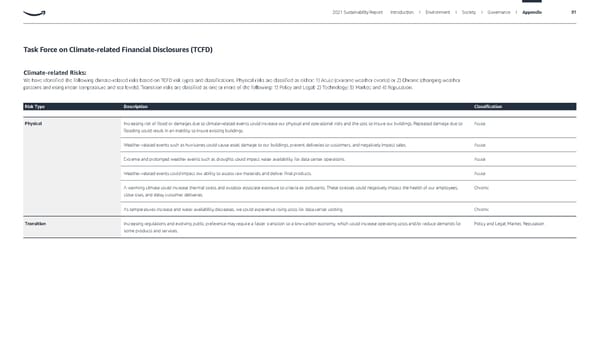Climate-related Risks: We have identified the following climate-related risks based on TCFD risk types and classifications. Physical risks are classified as either: 1) Acute (extreme weather events) or 2) Chronic (changing weather patterns and rising mean temperature and sea levels). Transition risks are classified as one or more of the following: 1) Policy and Legal; 2) Technology; 3) Market; and 4) Reputation. Risk Type Description Classification Physical Increasing risk of flood or damages due to climate-related events could increase our physical and operational risks and the cost to insure our buildings. Repeated damage due to flooding could result in an inability to insure existing buildings. Acute Weather-related events such as hurricanes could cause asset damage to our buildings, prevent deliveries to customers, and negatively impact sales. Acute Extreme and prolonged weather events such as droughts could impact water availability for data center operations. Acute Weather-related events could impact our ability to access raw materials and deliver final products. Acute A warming climate could increase thermal stress and outdoor associate exposure to criteria air pollutants. These stresses could negatively impact the health of our employees, close sites, and delay customer deliveries. Chronic As temperatures increase and water availability decreases, we could experience rising costs for data center cooling. Chronic Transition Increasing regulations and evolving public preference may require a faster transition to a low-carbon economy, which could increase operating costs and/or reduce demands for some products and services. Policy and Legal; Market; Reputation Task Force on Climate-related Financial Disclosures (TCFD) 2021 Sustainability Report Introduction I Environment I Society I Governance I Appendix 91
 ESG Report | Amazon Page 90 Page 92
ESG Report | Amazon Page 90 Page 92